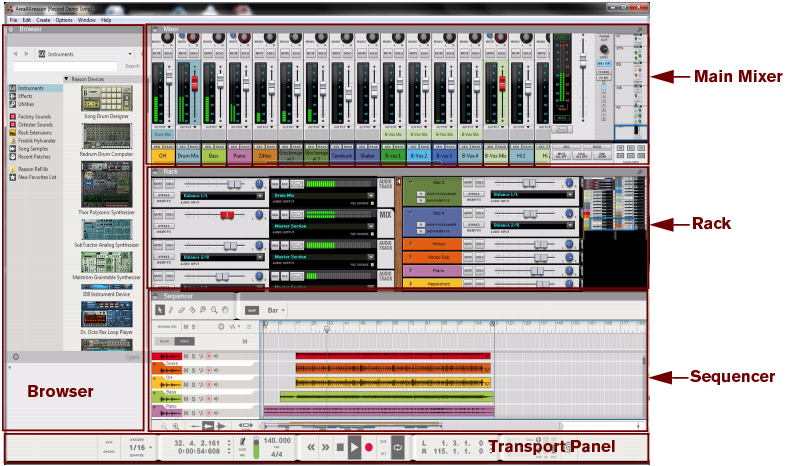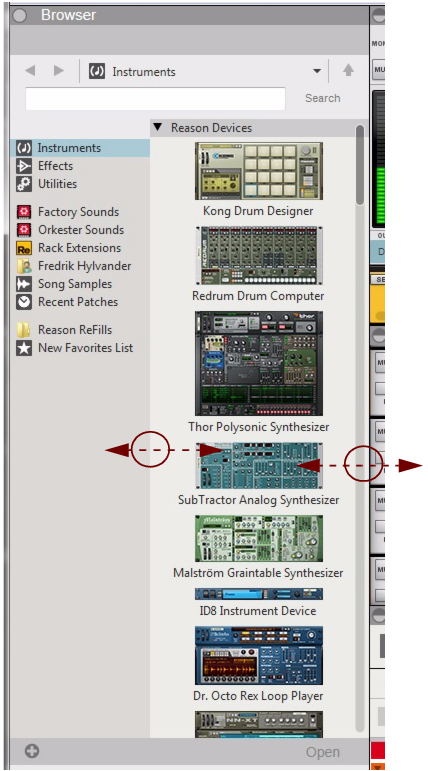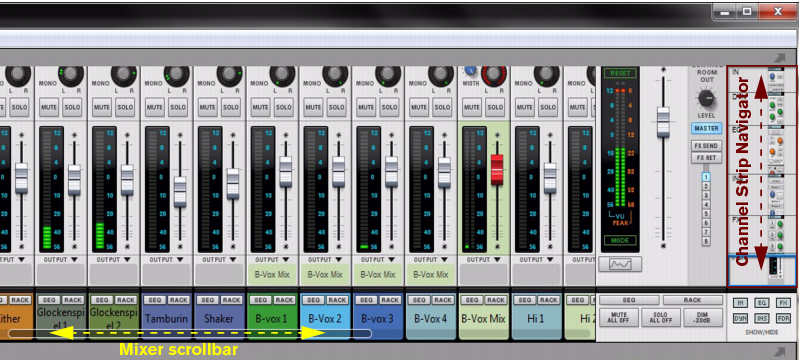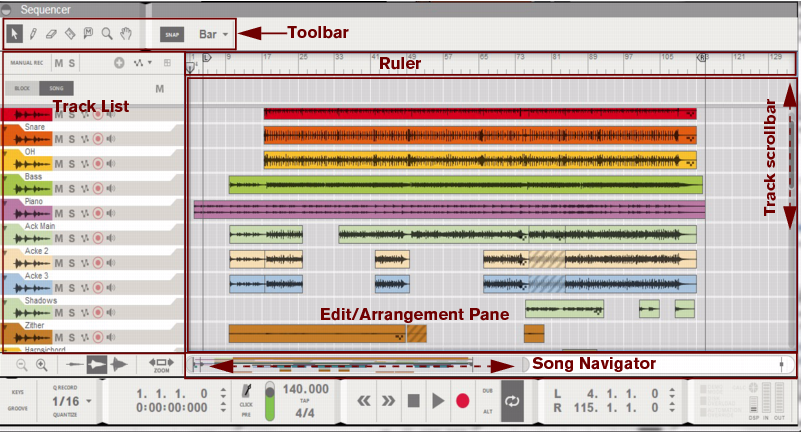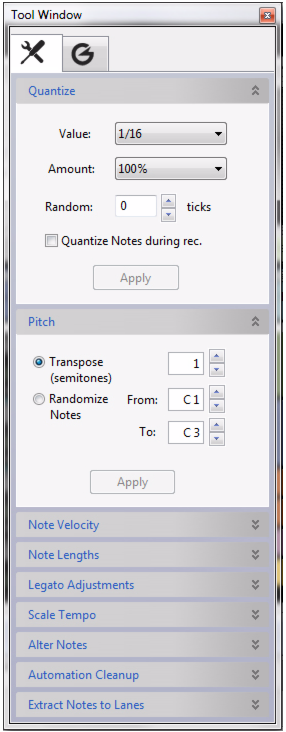The Main Mixer is located at the top in the Reason Song window. Here are the channel strips for the audio and instrument tracks in your song.
|
•
|
The Rack is where all sound and effects devices you use in your song are located. The Rack resembles a traditional hardware rack, where sound modules and effects units can be mounted.
The Sequencer is where you record your audio and instrument tracks. Here you can also record automation of device parameters in the Rack and of channel strip parameters in the Main Mixer. The Sequencer also incorporates the Transport Panel, where all sequencer transport controls are located.
The areas can be viewed together, as in the picture above, in pairs or separately - see “Navigating between the areas”. The areas can also be resized - see “Resizing”.
The Browser to the left in the Song window (and also in the Rack window, if the Rack is detached) features short-cuts for creating devices, loading patches and songs, and sample management functions. By pressing [F3] you can toggle between Show and Hide Browser.
|
•
|
See “About using the Browser in the detached rack” and “Creating devices” for information on how to use the “Device” functions.
|
|
•
|
See “Using the Browser” for information on how to browse for patches and songs.
|
|
•
|
See the “Sampling” chapter for information on how to use the “Song Samples” functions.
|
In the Main Mixer, all channel strips of the Reason song are visible. You can scroll vertically in the Main Mixer by clicking and dragging inside the frame in the Channel Strip Navigator to the right. This way you will be able to access all channel strip parameters. If you have a lot of channels ins your song you can also scroll horizontally by clicking and dragging the Mixer scrollbar at the bottom of the Main Mixer area.
|
•
|
To the right on the Mixer header is the Detach Main Mixer icon. Clicking this, or holding [Ctrl](Win) or [Cmd](Mac) and pressing [F5], will detach the Main Mixer and place it in a separate window.
|
In the Rack, all instruments, effects and mixer channel devices of the Reason song are visible. You can scroll vertically and horizontally in the Rack by clicking and dragging the frame in the Rack Navigator. You could also click anywhere outside the frame in the Rack Navigator to immediately jump to the desired position. Alternatively, place the pointer on any of the wooden “side panels” in the rack, and click and drag in any direction. This way you will be able to access all devices in the rack.
|
•
|
To the right on the Rack header is the Detach Rack icon. Clicking this, or holding [Ctrl](Win) or [Cmd](Mac) and pressing [F6], will detach the Rack and place it in a separate window.
|
When you detach the Rack, the Transport Panel at the bottom of the Sequencer will be duplicated below the Rack in the new window. This way, you will be able to control the Sequencer transport functions without needing to change window. There is also a second instance of the Browser available to the left in the detached Rack. By pressing [F3] you can toggle between Show and Hide Browser in the detached Rack.
To the left in the Sequencer, all tracks in the Reason song are listed in the Track List. By clicking on a track in the Track List you select the track for playback from a connected MIDI master keyboard and/or for recording.
The big center section of the Sequencer is called the Edit/Arrangement Pane. Here is where all recorded sequencer data is displayed.
You can scroll in the Sequencer by using the Track scrollbar to the right and the Song Navigator at the bottom of the Sequencer - see “Scrolling” and “Zooming in the Sequencer”.
At the bottom of the Reason Song window is the sequencer Transport Panel. From here you control the sequencer transport functions, such as Rewind, Fast Forward, Stop, Play and Record. You can also set Tempo and Time Signature and various other parameters.
The Transport Panel is always available together with the Sequencer. If you have detached the Rack, a duplicate of the Transport Panel will be also present in the Rack window.
To the right on the Transport Panel are indicators for Audio In and Out levels, DSP Load, Disk Overload, Audio Calculation, Demo Mode and Automation Override status.
By using the functions keys [F5], [F6] and [F7] you can quickly and easily navigate between the Main Mixer, Rack and Sequencer areas of the Reason window.
|
|
If the Main Mixer and/or the Rack are detached in separate windows, you have to press [F5] to view the Main Mixer window, [F6] to view the Rack window and [F7] to view the Sequencer window. It’s not possible to toggle between views/windows by repeatedly pressing the same function key.
|
It’s also possible to press any of the [F5], [F6] and [F7] function keys simultaneously in different combinations to switch between combined area views. For example, pressing [F5] and [F6] simultaneously will bring up a combined maximized view of the Main Mixer and Rack areas in the Reason window. The Sequencer area will then automatically become minimized
Pressing all three function keys simultaneously, or holding [Ctrl](Win) or [Cmd](Mac) and pressing [F7], will bring up all areas together, equally sized.
|
|
If the Main Mixer and/or the Rack are detached in separate windows, pressing any of the [F5], [F6] and [F7] keys in combination will automatically attach the corresponding (detached) window(s).
|
To select an area for editing etc., simply click anywhere in the desired area. The selected area will then be surrounded by a thin blue rectangle.
Deselecting “Show Navigators” on the Options menu will hide the Channel Strip Navigator in the Main Mixer and the Rack Navigator in the rack.
You can have several Songs open at the same time. Each Song will appear in a separate Song window, complete with Main Mixer, Rack, Sequencer and Transport Panel. Each Song window can be moved, minimized and resized using the standard Windows and Mac procedures.
The Tool Window is a floating window which features two tabs that contain functions for editing in the sequencer and for editing grooves for the ReGroove mixer. The Tool Window can be accessed from the Window menu.
|
•
|
See the “Note and Automation Editing” chapter for information on how to use the various functions of the “Sequencer Tools” tab.
|
|
•
|
See “The ReGroove Mixer” chapter for information on how to use the functions of the “Groove Settings” tab.
|
The On-screen Piano Keys floating window features a virtual keyboard which lets you play instrument devices without needing to have a MIDI master keyboard connected to your computer. The On-screen Piano Keys window can be accessed from the Window menu.
|
|
Open the On-screen Piano Keys window by pressing [F4], or by clicking the “Keys” button to the left on the Transport Panel. Alternatively, select “Show On-screen Piano Keys” from the Window menu.
|
See “On-screen Piano Keys” for more information.
